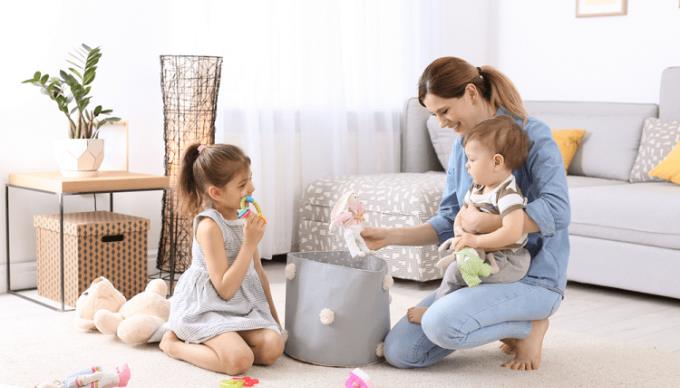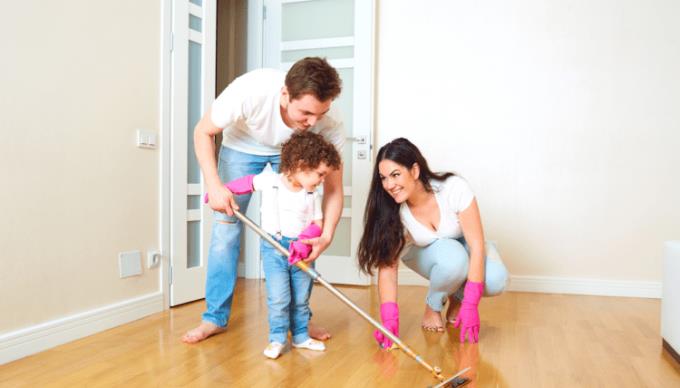Ways to determine an infants caloric needs

Learn how to determine your baby’s caloric needs, including the calories in breast milk and formula, to ensure your infant gets the right nutrition for healthy growth.
Young children often think that they are the center of the universe and it is everyone's responsibility to do everything for them. If children keep these thoughts, when they grow up they will become irresponsible people. Therefore, you should teach your children to understand the value of living responsibly with positive educational methods.
A responsible person is someone who fulfills his or her duties in the home, school and community. They are aware of responsibility for their actions. So, when they make a mistake, they admit it, apologize and try to correct it… And the irresponsible person often doesn't admit mistakes when they do it wrong. For example, if they have children but neglect, do not care, cause accidents to others, they rush away ... So how to raise children to become a responsible person from a young age? Please also aFamilyToday Health refer to the following.

When your child is young, you can help your child clean up his stuff until he can do it himself and you stop. Children will learn this faster if you teach them to be cheerful and not to scream if they accidentally spill or break things.
You teach them this so they can live independently . If your teaching is gentle and positive, your child will not protest and groan at what you say. When your child hears you say with gentle words: "We have to clean our things" or "Don't worry too much, I will help you", they will feel more interested in doing these tasks.
You need to let young children regularly contribute to common tasks so they can live more responsibly. Find out good behaviors and give comments about children, it could be actions of caring for them or helping friends ... When good behaviors are noted by you, children will continue to develop these good behaviors.
As children get older, their contributions increase, both inside and outside the family. Children need to be educated about the responsibility to take care of themselves and the responsibility to contribute to the common work of the family.
Of course, you cannot expect a child to have an immediate positive attitude. This needs to be developed slowly in age-appropriate ways.

If you do not want your child to think that contributing to housework is a "hard" job, don't let your child do housework without friends until he or she sees it as a routine in the family, not a compulsion. The goal is not to get work done, but to help your child feel happy and excited to be able to contribute his or her efforts to common things.
Young children always want to become talented people who can do anything. If you help your child do it, he or she will not feel it. You are working with your children to help them discover the joys of working. It is more important than getting the job done quickly or perfectly.
When preparing for school each morning, instead say, “Go brush your teeth fast! Have you compiled a pair yet? Don't forget lunch! ”… You can ask,“ What do I need to do next to prepare for school? ”. This will help your child remember things to do, and gradually they will get used to and do it themselves without your prompting.
This is very important in a child's life for many reasons. First, it helps your child to master bedtime procedures, clean up toys and get ready for school. After that, children will develop good learning habits and living habits. Eventually, your child will learn basic life skills through repeating household chores like washing clothes or making simple meals.
When the child hurts the child, do not force the child to apologize. The child will not understand and this is not helpful. Instead, listen to your child's feelings to discover why they are angry. After they feel better, ask them what they need to do. At this point, the child will be ready to apologize. If your child is embarrassed, you can suggest some other atoning actions such as reading a book to them, hugging them, etc. This will teach them that they must live responsibly with their actions and find a way. to correct the mistakes you make.
If you allow your child to compensate for some damages such as a child paying for losing books at the library, broken windows due to playing ball, etc., they are less likely to repeat these actions.

Being with your baby always to help solve problems can make them rely on you. If you let your child fix the problem on their own, whether it's just an apology or a promise, it's much better.
Be clear about the responsible living that you are doing. Keep your promises and don't make excuses. If you do not keep your promise to take them to the park when they get good grades, they will not comply with your promise.
Never scold children for being "irresponsible". Instead, teach your kids the skills they need to have. For example, if your child always loses things, teach them skills to fix this, such as always checking things carefully before going home from school ...

This is an extremely essential skill, especially in busy times. All children need to master this skill in high school, otherwise everything they do will not do well. Buy a notebook for your child, list the date and time on the left and ask them to fill in what to do. This will help reduce stress because the child knows what to do and when. More importantly, this is a way for you to teach your kids time management skills and take responsibility for your commitments.
Help your child understand "work pays". This will help your child live responsibly in the real world. You can ask your children to do small jobs like car wash, gardening ... age-appropriate at the end of school or during the summer break and pay them.
As a common reaction, when one person does something wrong, one wants to blame another, just as blaming can prevent the mistake from being repeated or release one's responsibility. In fact, guilt makes people want to defend themselves and is often more inclined to cover up than to correct. That's why some children lie to their parents . Even worse, when you blame your child, he or she will try to find all the reasons to justify his actions. Therefore, children will not understand their responsibilities and are more likely to repeat wrong actions.
Here are some things you can teach your children to live responsibly from a young age. As your child grows up, in order for them to firmly enter life, you need to teach them more life skills. Parents please refer to the article " 18 life skills for children, parents need to be for children ".
Learn how to determine your baby’s caloric needs, including the calories in breast milk and formula, to ensure your infant gets the right nutrition for healthy growth.
Discover the top 5 smartest dog breeds in the world, including Border Collie, Poodle, German Shepherd, Golden Retriever, and Doberman Pinscher. Learn about their unique traits and why they are considered the most intelligent dogs.
Discover 7 nutritious and delicious ways to cook egg porridge for babies, including recipes with cheese, pumpkin, tomato, and more. Learn how to prepare baby-friendly egg porridge with our expert tips.
After a series of medical measures they obtained a complete human vascular system profile.
Watermelon is one of the fruits that many people love, not only cheap but also delicious, nutritious and refreshing in the summer. To get delicious watermelon pieces, show off your housewives, your artistic talents to cut beautiful pieces of watermelon.
aFamilyToday Health - The digestive system and body in each baby is different. Parents need to recognize notes to deal with when babies have a food allergy!
Babies need many factors for perfect development. aFamilyToday Health shares with parents things to keep in mind when babies are 8 weeks old so that parents can take care of their babies the best!
Babies need many factors for perfect development. aFamilyToday Health shares with parents things to keep in mind when babies are 18 weeks so that parents can take care of their babies the best!
Babies need many factors for perfect development. aFamilyToday Health shares with parents things to keep in mind when babies are 28 weeks old so that parents can take care of their babies the best!
Babies need many factors for perfect development. aFamilyToday Health shares with parents things to keep in mind when babies are 32 weeks old so that parents can take care of their babies the best!








